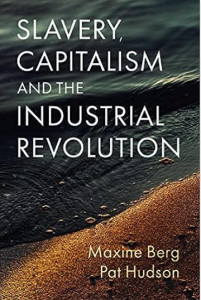I’m a sucker for any book about the Industrial Revolution, having grown up in its heartland in Lancashire cotton country, and have just read two. One was a re-read, of Joel Mokyr’s classic The Lever of Riches, as I wanted to refer to some aspects as I draft my new book. In particular, the many examples of time saving – for instance, “Although the paper industry is not often thought of as a typical industry of the Industrial Revolution, the Fourdrinier machine was in fact a revolutionary device. It reduced the time involved in making a given piece of paper from three weeks to three minutes.” The book focuses on the relationship between technological progress and economic growth to explore the perennial questions: why Britain? Why then?
The other is Maxine Berg and Pat Hudson’s new book Slavery, Capitalism and The Industrial Revolution. It’s a synthesis of a lot of recent research on Britain’s role in the slave trade and the economies of the Caribbean, and the interaction between slavery and empire and the way the Industrial Revolution in Britain took shape. I’ve read enough about the Industrial Revolution that I’d come across quite a lot of the material before – such as the links between compensation paid to slave-owners after abolition and the growth of financial services and funding of investment and consumption in Britain. The Bank of England has a fascinating working paper on compensation payments, and the UCL project is magisterial. The authors repeat the claim that the debt the government issued to pay compensation wasn’t paid off until 2015 – understandably, as the Treasury tweeted to that effect – although it’s more accurate to say that low interest rates then enabled the redemption of some consols.
But in any case the book does a terrific job of presenting a synoptic view of the role of slavery in answering the Why Britain? Why then? questions. History is over-determined, in retrospect. Searching for ‘a’ cause is doomed to fail. This book does not make that claim, acknowledging other explanations in the mix. It offers, though, an important perspective on an aspect of the Industrial Revolution that has only relatively recently come into focus.


As an amateur genealogist, I have been tracing what individuals and families who received compensation from the government did with the money they received as a result of the abolition of slave-holding. I believe that the orthodoxy is that the capital helped to propel technological development. My very non-scientific sample really doesn’t lend support to this idea though, and the wealth dissipates rapidly within a few generations. Much of it bought army commissions, which propped up colonial activity in India into the C.20 and positions within the Church of England, and kept people. “On their own account” in Bath and Clifton. There are instances where money supports Oxbridge fellows and even the King’s Observer at Greenwich. Mostly though, the influx of money doesn’t really “trickle down” or fuel technology advancement.